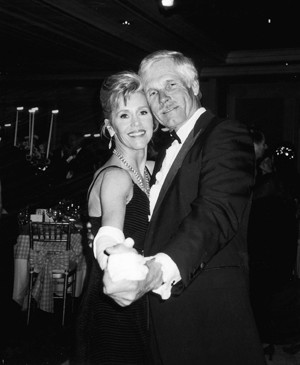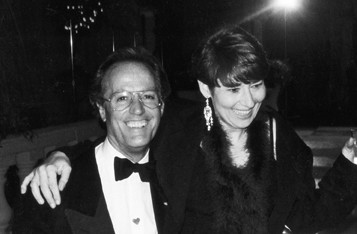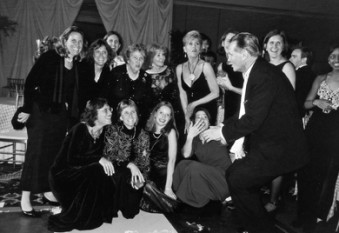My Life So Far (90 page)

—F
REDERICK
B
UECHNER,
Telling Secrets
Silence is the first thing within the power of the enslaved to shatter.
From that shattering, everything else spills forth.
—R
OBIN
M
ORGAN,
Demon Lover: The Roots of Terrorism
O
N
D
ECEMBER
21, 1997, the curtain went up on my third act. Ted threw me a wonderful sixtieth birthday party. Vanessa designed the invitation: On the front was a yellow road sign reading
WORK IN PROGRESS,
and it accordioned out into a series of photos of me in various phases of my life, ending with “to be continued.” Our families and friends were there—three hundred in all—and it was probably the most diverse group Atlanta had ever seen.
Keeping a secret is near to impossible for Ted, but he managed not to tell me what he was giving me as a gift, only teasing me by saying it was “a gift that would keep on giving.” That night he stood up and told the guests about how I had often said I thought he was smart to have set up his family foundation, because it guaranteed that all his children would be together with him at least four times a year.
“So for your sixtieth birthday, Jane, I’m giving you a ten-million-dollar family foundation.”
I thought I’d heard wrong. He asked me to come to the stage, and when I stood my knees buckled. I would have gone down had it not been for Max Cleland, one of Georgia’s U.S. senators and a triple Vietnam amputee, who was next to me in his wheelchair. When I got to the stage, I threw my arms around Ted, kissed him, and said to the guests, “He told me he was giving me a gift that would keep on giving . . . but, oh my God! I had no idea.”

Dancing with Ted at my sixtieth birthday party.
With the help of my friend the editor Nick Boxer, I had finished the twenty-minute video of my life, and later in the evening I showed it to the guests. Although they seemed interested, even moved by it—especially my women friends—it was of necessity done in such broad strokes that when I look at it today it seems quite superficial. I now realize it couldn’t possibly have had the impact on others that making it had on me, for it changed me in ways that would become apparent only as my third act began to unfold, and in ways I did not necessarily intend.
Toward the end of the video, over images of my life with Ted, I explained in a voice-over how eight years earlier I had decided to leave my life in California and commit to him because I wanted to accept the challenge of intimacy. I talked about how frightening this had been for me; how Katharine Hepburn’s advice to never get soggy had come back to me. And then I said, “Suddenly it hit me: This was what I was supposed to face, my biggest fear—intimacy, the one thing that had eluded me, a true, lasting, intimate relationship with a life partner. If I didn’t make a leap of faith, this would be the thing at the end of my life that was left undone; the big ‘if only.’”
I was sixty. I had done the hard work needed for intimacy to become a reality, at least on my end. The work was bearing fruit: I was beginning to sense what my marriage could be like if Ted and I really showed up for each other. Working on my birthday video had allowed me to see that there
was
a “there there” within me after all. It exposed for me the threads of continuity, like suspension bridges, that had spanned the canyons of change in my life. I could see that the main thread was courage in everything
except
my personal life.
As the weeks went by following my birthday, I became aware of feeling more like
me,
a whole being, standing next to but no longer overlapping into the being that was Ted. I was ready. But I knew it wouldn’t happen unless Ted was willing to make some changes in the way he regarded our relationship. Unfortunately, his tendency was to like things just the way they were, and despite my growing self-esteem I
still
wasn’t able to come right out and ask for what I wanted—even after I had realized that there could be no truly intimate relationship between us unless I spoke my truth.
I still felt I had to please him at the expense of myself.
The subtle power of sexist roles and their inherent inequality has been deeply imprinted in all of us raised under them.

Peter and Nathalie at the birthday party.

The birthday party: Jon Voight cracking up the Fonda cousins (all women) from out west.
More and more frequently I’d send him subtle signals about how I was feeling, and when the signals weren’t received, I would drink to numb myself until the anger had passed. If he’d bothered to look closely, Ted could have seen the silent me, like a trout swimming out from behind a rock and coming closer to the surface. But Ted is not a close looker, especially if what he might find would risk muddying his waters, and I—accomplice that I was—wasn’t willing to break the surface. One voice was telling me,
Jane, you can’t go on this way,
while another (very strong) voice was whispering,
Maybe you shouldn’t rock the boat. Things are okay. It’s an interesting life. He’s a wonderful man.
Out of love and respect for Ted and his children, I will not go into specifics about what was not working in our relationship. Quite honestly it is not necessary, and I have already given you a sense of the issues. What I
can
write about (and what is important because of its universality) is how in spite of everything I remained paralyzed when it came to actually speaking up for myself in ways I feared might end the relationship. And I
can
write about how it took two more years for me to get up the courage to do it. I had been unafraid to travel to North Vietnam in an effort to help end the war; to place myself in harm’s way; to risk public censure; to stand up to the government when I thought what they were doing was wrong. But when it came to a relationship with a man, I still could not raise my voice.
And I wasn’t even dependent on him financially!
One specific problem that increasingly wore me down was all the traveling. While it had seemed relatively easy and fun at first, I hadn’t realized that it would never end, that we would be continually on the move, like migrating birds, always packing, never totally unpacking. First there was one place in Argentina, and we’d go there for a restful week or ten days of fishing when it was winter in North America. But then Ted added two more properties in Argentina, so that even when we were there we were shuttling from one place to another.
Guilt was beginning to set in when I didn’t want to fish every single day, when I didn’t want every hour programmed. Some days I wanted to do nothing . . . just read, think. I wanted to acknowledge to Ted that I was on a journey and invite him to join me, but it required slowing down to what psychologist Marion Woodman calls “soulspeed,” and for the driven, soulspeed feels like death. Quincy Jones put it well in his autobiography,
Q:
I was always running, but every time I ran I kept crashing into myself coming from the opposite direction, and
he
didn’t know where he was going either. I ran because there was nothing behind me to hold me up. I ran because I thought that was all there was to do. I thought that to stay in one place meant to die.
I thought it was a male thing, until I read
Miss America by Day,
by former Miss America Marilyn Van Derbur, whose father had committed incest with her from age five until eighteen. She writes movingly about how often victims of early abuse (sexual, physical, or psychological) must stay busy, keep moving, so as to avoid feelings that might otherwise arise. Ted had to keep moving so that his demons wouldn’t catch up with him. I felt empathy for him, but I was becoming aware that there was no
deepening
to our life, just a lateral repetition of scheduled activities. Now that I had started my last act, I wanted to stop all the
doing
and start
being—
to slow down and show up. Ted couldn’t. When it came right down to it, I think he was scared.
I began to descend into quiet desolation, disappearing into sleep much of the time. Ted, I was discovering, thought that intimacy meant to tell his innermost thoughts to his significant other, which was odd since he told his innermost thoughts to everyone. But
listening,
in turn,
to
that other? No. I was becoming aware of how nearly impossible it was to have a two-way conversation with Ted, unless I was talking about something he could easily recognize as relevant to himself. There just wasn’t room in his brain for words other than his own. It’s not as if I hadn’t seen the warning signs.
Time was fleeting; color was beginning to drain out of things; the nictitating membrane was settling in; increasingly I found myself engaging in angry mind rehearsals with Ted and venting to my closest women friends. I would think, I don’t want to live laterally anymore, skimming over the surface. Vertical is how I need to live. Moving so fast through life leaves no time for the spirit, for mystery, for the existential.
I asked him, “Who are you, Ted? Beneath your worldly successes and the applause and clamor of the crowd, who are you?” I tried to explain by using myself as an example: “I have been an award-winning actor, but that’s just what I
did,
that’s not who I
am.
If that was who I am, I’d have been miserable leaving it all behind.” I tried to tell him who I felt I was: a woman in the last act of her life who wanted to be authentic, whole, to deepen my life, to embody the soul I felt hovering around me, asking to be invited in.
I love Ted and always will, and I knew that it wasn’t for lack of intelligence that he didn’t understand me. Well, yes, in a way it was—lack of emotional intelligence, the result of his traumatic childhood.
Perhaps I could have handled the constant traveling if it hadn’t been for the other things that hurt me; if I had been allowed more time on my own every now and then; if I had been able to spend more time with my emotionally accessible women friends, my children, my organization. Perhaps I would have been able to return to him better able to accept not only his drivenness but his enmeshment. He fears if no one is there to witness him, he will no longer exist.
Then something quite unexpected was thrown into this unsettled mix: the magic of grandmotherhood. Vanessa told me she was pregnant, and I knew that I wanted and needed to be there for her in whatever ways I could. Ted had always generously gone out of his way to help Vanessa and me grow closer, inviting her to travel with us, even offering her a job at Avalon Plantation doing what she does so well—organic farming. But when I told him she was going to have a baby and that I wanted to be there for her as much as possible, he exploded in rage. I think he sensed that my energy would be drawn away from him for a while. But frankly I was stunned and disturbed by his reaction.